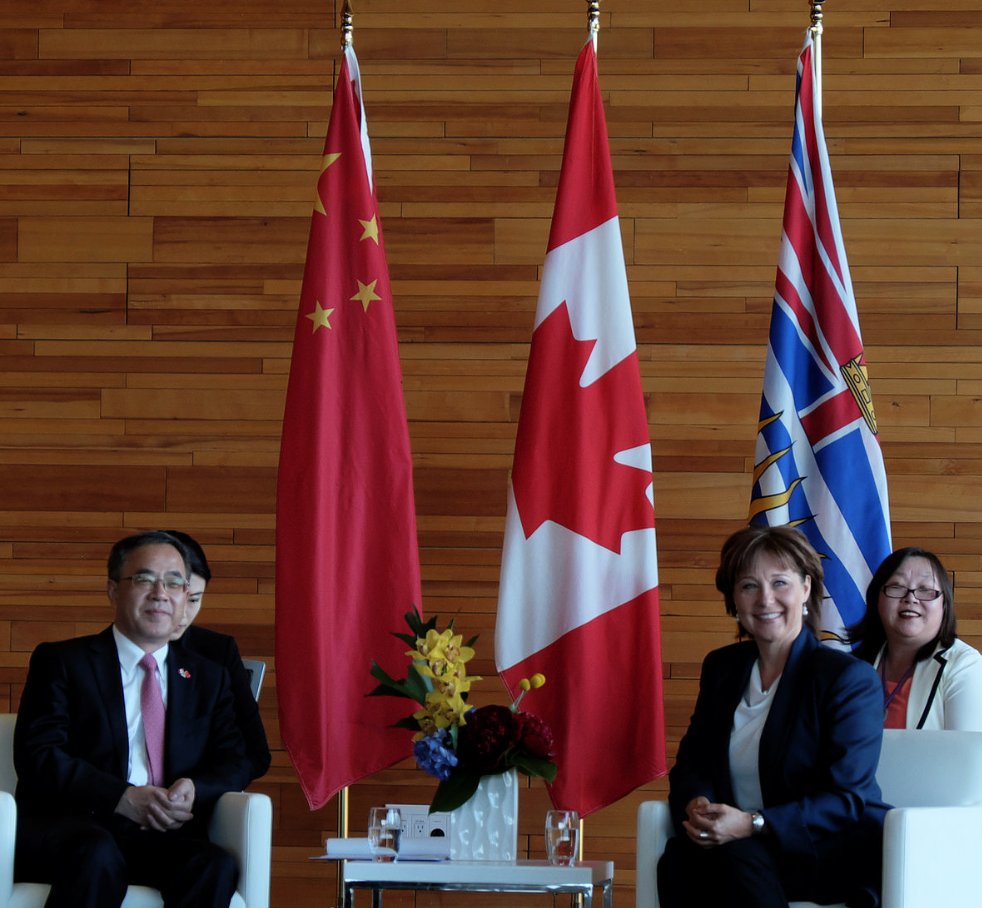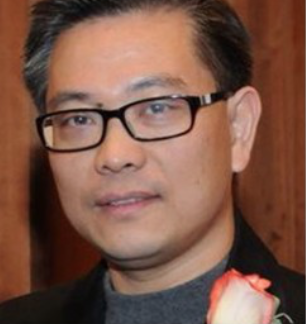

Clark and Hu Chunhua, Chinese Communist Party Politburo member, in May 2016. (BC Gov)
Bob Mackin
What is the real elephant in the room in the British Columbia election of 2017?
China.
U.S. President Donald Trump’s 20% tariff on Canadian lumber became an issue this week and it figured in the April 26 leaders’ debate. But neither of the two debates featured any substantial discussion about emerging superpower China, the second-most important foreign country to Canada’s only Pacific province.
You’ve seen this movie before. Remember the Munk debate on foreign policy during the 2015 federal election? China was not one of the topics on the agenda for Stephen Harper, Tom Mulcair or Justin Trudeau.
China matters to B.C. and Canada for obvious trade, tourism and immigration reasons. The unprecedented and overwhelming migration of Mainland Chinese wealth has fuelled the real estate and construction boom in Vancouver. The consequences have included empty houses, displaced residents, and students and housewives claiming to own mansions. When Christy Clark calls the economy strong, it is because of the flood of Chinese money into the luxury housing and luxury car markets in the Lower Mainland. One of her donors, Paul Oei, is facing a B.C. Securities Commission fraud hearing that started the day before the election was formally called.
Here is the irony.
The same night that three leaders omitted China from their debate in the CBC studio, the Chinese government targeted five people that it believes are corrupt fugitives now living in British Columbia.
The Central Commission for Discipline Inspection published a rogues gallery of 22 people wanted for criminal prosecution in China, and encouraged overseas Chinese to report their whereabouts.

Michael Ching: wanted in China
We already know one of them: developer Michael Ching. Also known as Cheng Muyang, he was accused of embezzlement and named in a previous rogues’ gallery two years ago. He is the son of Cheng Wei Gao, the former Communist Party boss in Hebei province expelled from the party in 2003 for corruption.
Ching is well-known for his ties to the federal Liberal Party and support of Justin Trudeau. He is described by the Chinese government as former chairman of Hong Kong Jiadali Investment Co. Ltd. and former manager of the Beijing subsidiary of Beifang International Advertisement Company.
Who are the others?
Xiao Bin, former general manager of Qiqihar Credit Guarantee Co. Ltd. of Heilongjiang Province. Accused of embezzlement. Fled to Canada in January 2011, possibly living on Ackroyd Road in Richmond.
Li Wenge, former vice-chairman of Trade Union of the State Taxation Bureau of Panlong District of Kunming City. Fled to Canada in August 2013, possibly living on Barnard Drive in Richmond. Accused of contract fraud and fundraising fraud.
Wang Qingwei, former financial staff member of Qingqi Group Hong Kong Co., Ltd. Accused of letter of credit fraud. Fled to Canada in April 2005, possibly living on Hope River Road in Chilliwack.
He Jian, former president of Fang Da Housing Development Co. Ltd. at Qihuangdao Port. Accused of embezzlement and misappropriation of public funds. Fled to Canada in September 2010, possibly living on Dover Road in Nanaimo.
This is the latest step in President Xi Jinping’s much-publicized anti-corruption campaign. In a 2015 interview, Ching’s lawyer, David Matas of Winnipeg, described it as a “political pawn game,” intended more to shore-up Xi’s power than to actually clean-up government. Matas pointed out that evidence against Ching was gained via torture of witnesses.
“The Communist Party controls the country, it does it behind closed doors. The issue of choice around which the power struggle revolves is corruption,” Matas said. “There is no system of law, there are courts and there is legislation, but the party controls the courts and the legislature, and the courts don’t control the party. There is no way, other than this power struggle, of dealing with corruption issues.”
Matas was lawyer for fugitive Lai Changxing, who was deported in 2011 from Vancouver to China where he was jailed for a multi-billion dollar smuggling scheme. Canada has no extradition treaty with China, but the Chinese government agreed not to execute Lai.
In 2007, during Christy Clark’s hiatus from politics, she became chair of the education division of RCI Capital. The Vancouver investment firm is involved in a controversial Quebec immigration scheme aimed at attracting Chinese investors seeking expedited Canadian citizenship. Instead of settling in Quebec, most participants came to B.C.











